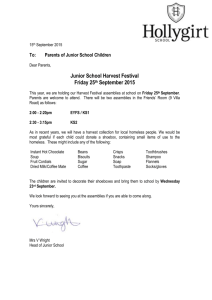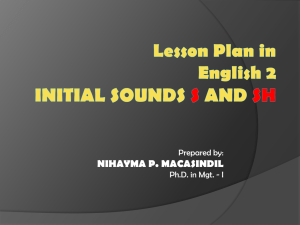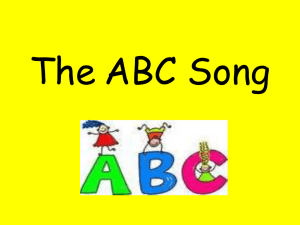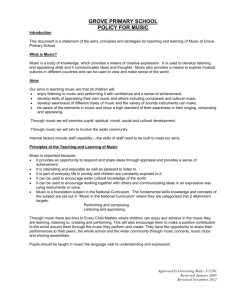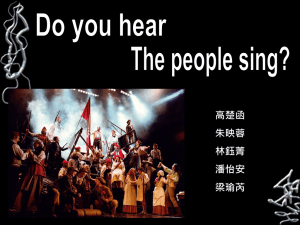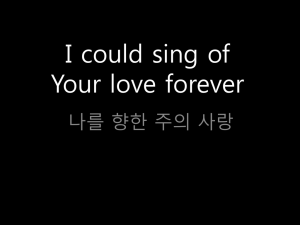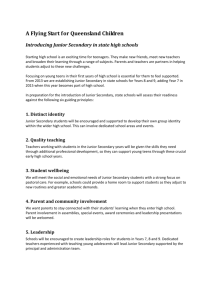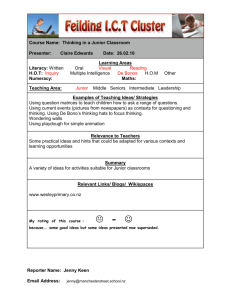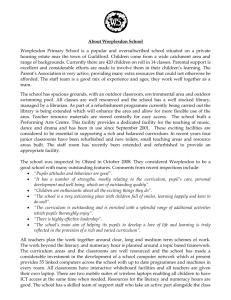Music Policy 2014-15 - St Mary`s Catholic Primary School, Wrexham
advertisement
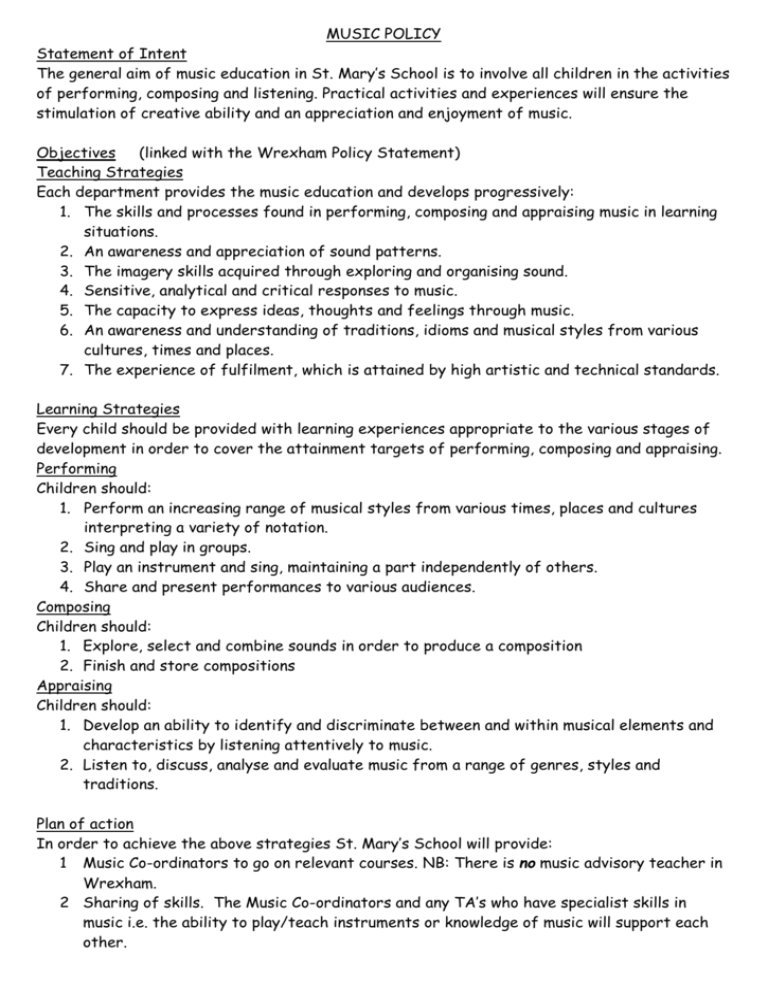
MUSIC POLICY Statement of Intent The general aim of music education in St. Mary’s School is to involve all children in the activities of performing, composing and listening. Practical activities and experiences will ensure the stimulation of creative ability and an appreciation and enjoyment of music. Objectives (linked with the Wrexham Policy Statement) Teaching Strategies Each department provides the music education and develops progressively: 1. The skills and processes found in performing, composing and appraising music in learning situations. 2. An awareness and appreciation of sound patterns. 3. The imagery skills acquired through exploring and organising sound. 4. Sensitive, analytical and critical responses to music. 5. The capacity to express ideas, thoughts and feelings through music. 6. An awareness and understanding of traditions, idioms and musical styles from various cultures, times and places. 7. The experience of fulfilment, which is attained by high artistic and technical standards. Learning Strategies Every child should be provided with learning experiences appropriate to the various stages of development in order to cover the attainment targets of performing, composing and appraising. Performing Children should: 1. Perform an increasing range of musical styles from various times, places and cultures interpreting a variety of notation. 2. Sing and play in groups. 3. Play an instrument and sing, maintaining a part independently of others. 4. Share and present performances to various audiences. Composing Children should: 1. Explore, select and combine sounds in order to produce a composition 2. Finish and store compositions Appraising Children should: 1. Develop an ability to identify and discriminate between and within musical elements and characteristics by listening attentively to music. 2. Listen to, discuss, analyse and evaluate music from a range of genres, styles and traditions. Plan of action In order to achieve the above strategies St. Mary’s School will provide: 1 Music Co-ordinators to go on relevant courses. NB: There is no music advisory teacher in Wrexham. 2 Sharing of skills. The Music Co-ordinators and any TA’s who have specialist skills in music i.e. the ability to play/teach instruments or knowledge of music will support each other. 3 Appropriate resources in the way of adequate equipment, instruments, music books and tapes and I.C.T. resources, i.e. The scheme ‘Sounds of Music’ (Yrs 1/2, 3/4 , 5/6), ‘Super Duper Music Looper’ and Moving On’ (Y5/6), ‘2 Simple Music’ (Y3/4), ‘Can Sing’ (throughout the school). 4 Music Theory is also taught to all junior children who learn an instrument with the Peripatetic Music Team. Activities FOUNDATION PHASE See ‘Creative Development’ policy KS2 Junior and occasionally whole school singing sessions, to learn hymns/songs for assemblies, Masses and Junior Productions 1 Sounds of Music scheme and Sounds Creative schemes including percussion work. 2 Interactive Whiteboard resources (from the web) 3 Class practices for assemblies and Masses/Liturgies. 4 Listening to music during assemblies and in lessons. 5 Peripatetic music lessons in flute, clarinet, cornet, violin, cello, double bass and guitar. Children who show interest or aptitude are tested throughout the junior years. Able children play at Masses and concerts. 6 A ‘Singing Squad’ open to all junior children 7 Diocesan workshops from Mr. Paul Booth (Diocesan Director of Music) Each child in both Key Stages will be given a chance to sing or play as part of a group or as an individual. All children share a performance with an audience during termly Monitoring assemblies. Curriculum Cymraeg Welsh is used incidentally in the school as often as opportunities allow. This will apply equally to music. Welsh folk songs will be learned each year. Where applicable children will be given opportunities in their study of music to develop and apply their knowledge and understanding of the cultural, historical and linguistic characteristics of Wales. Additional Learning Needs/More Able and Talented All pupils will receive musical experiences as part of a mixed ability group. Assessment of individual pupils needs takes place as part of the on-going teaching and learning cycle. Appropriate differentiation is put in place to meet these needs. Equal Opportunities Equal opportunities are given to all pupils of all abilities in this subject area. We have carefully considered and analysed the impact of this policy on equality and the possible implications for pupils with protected characteristics, as part of our commitment to meet the Public Sector Equality Duty requirement to have due regard to the need to eliminate discrimination, advance equality of opportunity and foster good relations. Health and Safety Children will be encouraged to consider safety implications concerning themselves and others when selecting and using instruments/equipment. Dangers of misuse of equipment will be constantly reinforced. Parental Involvement The school recognises the positive contributions that can be made by parents, for example in helping children to learn songs for school productions. Also taking responsibility for instrument loans to children. Continuity The National Curriculum directives for music, the school’s policy and scheme of work give a structure for continuity throughout the school. Monitoring In line with the school development plan there will be a regular and systematic monitoring of the progress of music throughout the school. This will be carried out by the subject coordinator who will monitor music lessons of PPA teacher; also monitoring assemblies are recorded by the headteacher. ICT Wherever applicable children will use ICT to support their work. Children will be given opportunities where appropriate to develop and apply their information technology capability. ‘Super Duper Music Looper’ (Y5/6) and ‘2 Simple Music’ (Y3/4) for use with the interactive whiteboard are also incorporated into the scheme. Common Requirements Wherever appropriate, children have the opportunities to develop and apply the common requirements through their study of Music. These common requirements are identified explicitly in the scheme of work by means of the abbreviations in the key below. In addition every opportunity is taken to develop the common requirements more implicitly or incidentally. C.C. Curriculum Cymreig C. Communication Skills M. Mathematical Skills I.T. Information Technology P.S. Problem Solving Skills Cr. Creative Skills PSE Personal/Social Education Resources The school has two pianos and synthesisers. Other instruments are violins, cellos, a double bass, cornets, a tenor horn, clarinets, flutes, guitars, tuned and un-tuned percussion. Music stands / ‘Sounds of Music’ (SoW) / ‘Super Duper Music Looper’ / ‘2 Simple Music’ / ‘Can Sing’ Updated January 2015 Mrs L. Shaw (Music Co-ordinator) ‘Moving On’
